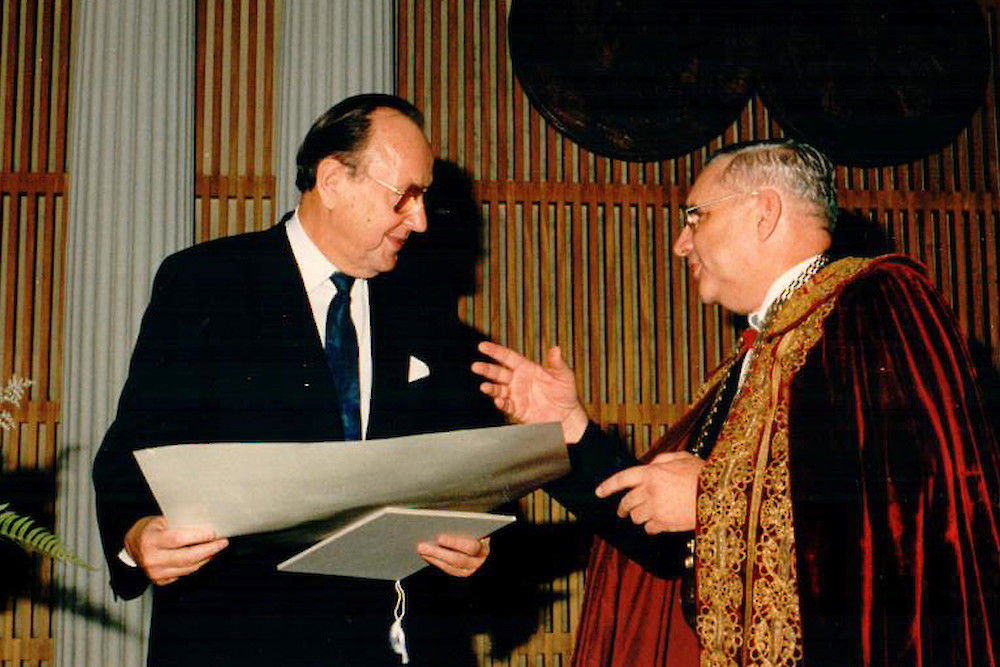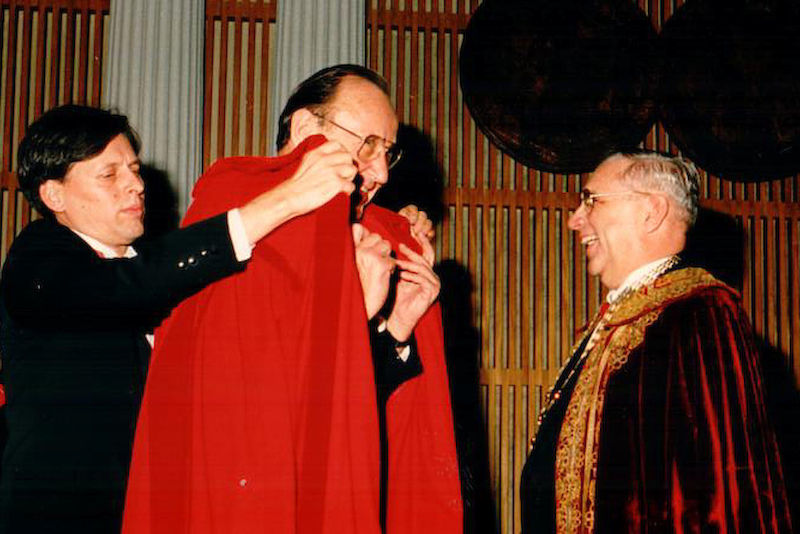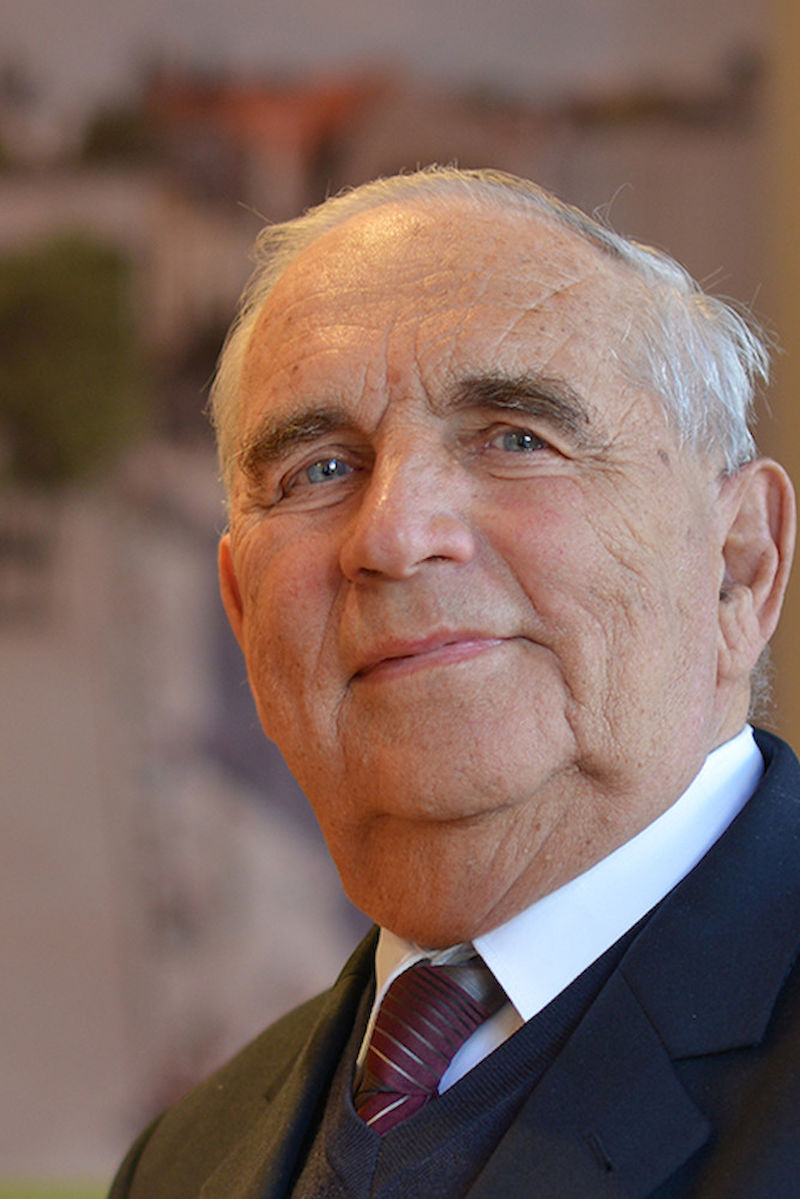"Genscher helped open doors"

Do you remember how you first met Hans-Dietrich Genscher?
Günther Schilling: It was largely a matter of chance, actually. In May 1991, Genscher was to receive an honorary doctorate from the University of South Carolina in Columbia, which is the state capital. The Americans had said that he was free to bring along a German delegation to accompany him on his trip. It was basically his idea to invite along a theologian and me, as the rector of his alma mater. He had started studying law in Halle back in 1946. Of course, I was delighted about the invitation. It was the start of a close relationship with many more pleasant meetings.
What memories do you have of that first encounter?
Before we flew to Columbia we spent a few days in New York and Washington. From the beginning, Genscher was very open and he helped open doors. Although he was only three years older than I was, he had an aura that made him something of a father figure for me. I was particularly impressed by how he conducted conversations. He always had a casual manner, but everything he said seemed to be well thought out. He was always keen to establish harmony rather than seek confrontation. That was his absolute strength.
Can you give any examples of Genscher’s achievements on behalf of the University of Halle?
He expressed his commitment to the city of Halle and Martin Luther University through very concrete action. He channelled material resources our way that would have ended up somewhere in eastern Germany but not necessarily in Halle. One example was the generous gift of a US army barracks library from Göppingen in Swabia. In March 1992 it gave our University and State Library 16,000 volumes on various academic topics. Of course, Genscher was present at the handover himself, along with representatives of the US State Department and the state government of Saxony-Anhalt. He had used his unique diplomatic skill to ensure the University of Halle had come under consideration as the new owner of the books.
How was Genscher able to provide assistance in the political arena?
Back then, the modernisation of the university was a major topic on the agenda. We had to establish new structures in terms of facilities and staffing, drive forward the democratisation process, guarantee freedom of scientific thought, and make the university more international. At the time we offered more than 70 courses of study, whose content had to be checked and adapted. We were legally obliged to wind up all institutions and courses that had propagated Marxist-Leninist ideology. Genscher accompanied this process by holding conversations with those concerned. He was a good listener, and he was able to put himself in the position of the person he was speaking with. He was a diplomat through and through.
But he wasn’t afraid to speak his mind very clearly, as one example from your time as rector shows.
Yes, that’s true. I remember an occasion back in 1991 when the university was facing a new round of cuts. The state ministry of culture and science in Magdeburg, which was responsible for us, had announced a few days earlier that we had to cut another 1,000 jobs over the coming months. At that time – June 1991 – Genscher was due to receive his certificate as an honorary citizen of Halle. As the university rector, I had been invited to the ceremony and was sitting at the same table as Genscher. I told him about the news from Magdeburg, saying that I was preparing for some tough negotiations and that cutting such a large number of jobs would threaten the university’s survival. Shortly after our conversation, Genscher excused himself and switched to the neighbouring table, where Gerd Gies, then the minister-president of Saxony-Anhalt, was sitting. Genscher and Gies had a long conversation. To this day, I don’t know what they spoke about. But I don’t think it was a coincidence that the next day we received a telegram from Magdeburg retracting the demand for job cuts.

Were the university staff aware of Genscher’s assistance? How did they say thank you?
I think everyone involved at the time knew what Genscher had done for us. That is partly why he received the title of Honorary Senator in 1992. Only very few people have been awarded that honour to this day. They include Halle’s former mayor Richard Robert Rive, banker Heinrich Lehmann, and Swedish philanthropist Elsa Brändström. Genscher was delighted about it. He liked the robes, too, which we had gone back to wearing on special occasions and even paid a special visit to the university before the award ceremony for a robe fitting session.
The university remembers its honorary senator
Hans-Dietrich Genscher died on March 31 in 2016, at the age of 89. At the meeting of the Academic Senate in April, Senate members honored him with a moment of silence. Rector Udo Sträter praised Genscher’s accomplishments: “Hans-Dietrich Genscher was a tireless advocate for Halle, and his efforts on behalf of his hometown also included working toward its cultural and academic interests. He had maintained ties with the university since his days as a student of law. It is thanks in part to his great efforts that the Francke Foundations, which the university uses as its campus, were renovated and revitalised. We remember him with respect and gratitude.”

